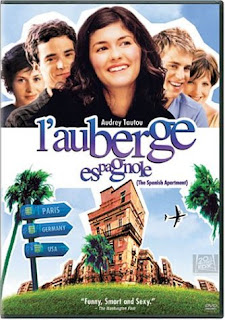 A couple of nights ago, I told The Wife my new preference in movies. "Short and funny," I said; I wanted them to be barely 90 minutes long and with at least one moment that makes me laugh. The Baxter was the first test of the new regime, and it passed with flying colors; this obscure mid-00s romantic comedy is both honestly funny and doesn't outstay its welcome.
A couple of nights ago, I told The Wife my new preference in movies. "Short and funny," I said; I wanted them to be barely 90 minutes long and with at least one moment that makes me laugh. The Baxter was the first test of the new regime, and it passed with flying colors; this obscure mid-00s romantic comedy is both honestly funny and doesn't outstay its welcome.It's a vehicle for Michael Showalter (the large dweeb on the box cover), who wrote, directed, and starred as Eliot Sherman, the king of the "Baxters." A Baxter is the nice, dependable guy in a romantic comedy -- the one the heroine is planning to marry, but doesn't, because she gets swept off her feet by the romantic male lead (who is usually, in Elliot's experience, a man from her past). There's an entertaining sequence about halfway through the movie where he's seen being the Baxter to four different women, all of whom dumped him to be with the love of their lives.
The Baxter opens at Elliot's wedding to Caroline (Elizabeth Banks), which of course is interrupted by her old high school boyfriend Bradley (Justin Theroux) bursting in to declare his undying love for Caroline. The movie then flashes back to Elliot's first meeting with Caroline...and, immediately before that, with Cecil Mills (Michelle Williams).
Caroline is gorgeous, yes. And Elliot falls for her quickly, which is understandable. (It's not as clear what she sees in him, unless she's settling for a nice, dependable guy.) But it's immediately obvious that Cecil is perfect for him -- she shows definite signs of being the female equivalent of a Baxter.
But the plot has to have somewhere to go, so, once we're all clear on the eventual end of the movie, it dives back into the current day, about two weeks before Elliot and Caroline's (still-unplanned, which is insane) wedding. Bradley -- dark, mysterious, scientific, rich, sensitive -- comes back into Caroline's life unexpectedly, and Elliot is sure that his Baxter luck is going to strike again.
As his and Caroline's relationship unravels, there are a lot of good scenes with a whole lot of solid actors -- I'll mention only Peter Dinklage as Benson Hedges the wedding planner, because Dinklage runs away with his scene (mostly through subtle facial expressions and eye gestures). The Wife and I expressed a willingness to see any movie with Peter Dinklage once The Baxter was over; he's amazingly good and amazingly funny and probably would have grossed ten billion dollars at the box office by now if he was eight or nine inches taller. (And, who knows? He still might -- he's that good. Watching him act, you forget how short he is and only see his character.)
Anyway, the first scene tells you how the movie ends -- though The Baxter is one of those movies where you practically forget that first scene until you get back to it, and then get reminded, suddenly, that you already know what happens at the wedding. But there is a happy ending for Elliot, as there had to be...though, even there, it means someone else gets to be the Baxter this time.
The Baxter has some minor failures of logic, and Elliot is just a bit too dweeby and stiff most of the time -- he's a comedian's caricature to get laughs rather than a rounded character at least some of the time. But, that said, it's a very enjoyable movie, with a bunch of funny scenes, and Michelle Williams is a real cutie here, fulfilling the most important role in a rom-com: being the person that you look at and say "Of course the main character should be with her!"

















